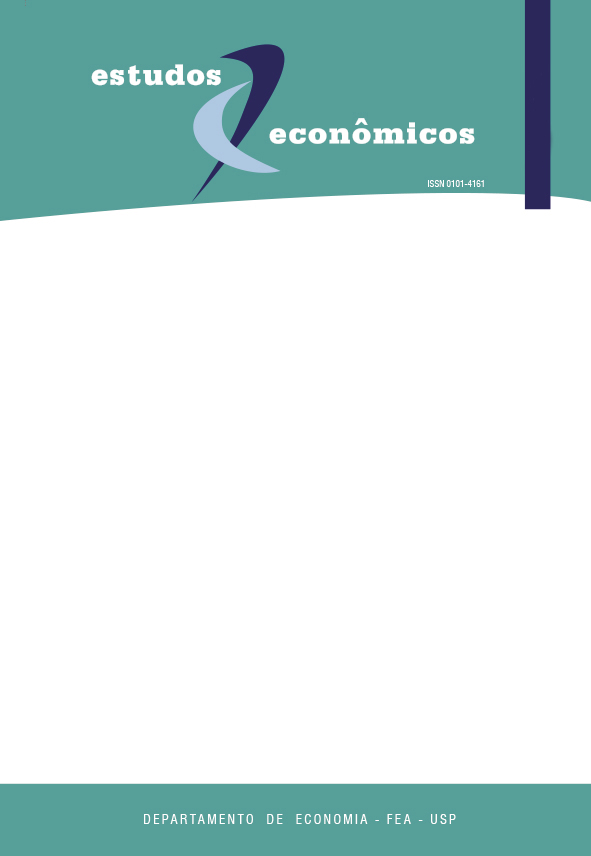Barbon versus Locke sobre o valor da moeda
DOI:
https://doi.org/10.1590/S0101-41612011000400001Palavras-chave:
Barbon, Locke, valorização do dinheiro, preços, teoria quantitativa da moedaResumo
O artigo discute as posições contrastantes de Nicholas Barbon e John Locke no debate monetário inglês sobre a "valorização do dinheiro" dos anos 1690. Embora referidos às condições do sistema monetário inglês da época, os temas e argumentos do debate foram fundamentais na formação da teoria monetária e da teoria econômica, entre o final do século XVII e o século XVIII. O artigo acompanha a crítica de Barbon a Locke, e procura efetuar um sumário da teoria monetária de Locke, cuja importância no debate econômico se estendeu por 150 anos.
Downloads
Referências
Barbon, N. A Discourse of Trade (1690). A Reprint of Economic Tracts. Baltimore, The Lord Baltimore Press, 1905. Disponível em: <http://oll.libertyfund.org/title/982. Acesso em: 10/08/2010.
Boyer, J. (2003) La Pensée monétaire – Histoire et Analyse. Paris, Éditions Les Solos, ISBN 2.915224.00.5. Disponível em: http://jdbdr.free.fr/
Caffentzis, C. (1989) Clipped Coins, Abuded Words & Civil Government – John Locke’s Philosophy of Money. New York, Autonomedia.
Cantillon, R. (2001) Essay on the Nature of Commerce in General (1755). London, Transaction Publishers.
Eltis, W. (1995) John Locke, the quantity theory of money and the establishment of a sound currency. In: Blaug, M. (org.). The Quantity Theory of Money – from Locke to Keynes and Friedman. Chippenham, Edward Elgar.
Galiani, F. (2000) Della Moneta (1751). Curitiba, Segesta/Musa.
Hutchison, T. (1988) Before Adam Smith – The Emergence of Political Economy, 1662-1776. Oxford, Basil Blackwell.
Kelly, P. H. (1991) General Introduction: Locke on Money. In: Locke, J. Locke on Money. Oxford, Clarendon Press.
Klindeberger, C. P. (1993) A Financial History of Western Europe, Second Edition. Oxford, Oxford University Press.
Law, J. (1705) Money and Trade Considered: with a proposal for supplying the nation with money. Glasgow, R. & A. Foulis.
Letwin, W. (1963) The Origins of Scientific Economics: English Economic Thought 1660-1776. London, Methuen.
Locke, J. Further Considerations Concerning Raising the Value of Money (1696). In: Locke, J. The Works of John Locke in Nine Volumes. London, Rivington, 12th ed., 1824. Disponível em: <http://oll.libertyfund.org/EBooks/Locke 0128.04.pdf >. Acesso em: 10/08/2010.
Locke, J. Two Treatises of Government (1689). In: Locke, J. The Works of John Locke in Nine Volumes. London, Rivington, 12th ed., 1824. Disponível em: <http://oll.libertyfund.org/EBooks/Locke 0128.04.pdf >. Acesso em 10/08/2010.
Locke, J. Some Considerations of the Consequences of the Lowering of Interest, and Raising the Value of Money (1691). In: Locke, J. The Works of John Locke in Nine Volumes. London, Rivington, 12th ed., 1824. Disponível em: <http://oll.libertyfund.org/EBooks/Locke 0128.04.pdf.> Acesso em: 10/08/2010.
Mun, T. (1986) England’s Treasure by Forraign Trade (1664). N. York, Augustus M. Kelley.
Murphy, A. (1988) Richard Cantillon, entrepreneur and economist. Oxford, Clarendon.
Ricardo, D. The High Price of Bullion.
Schumpeter, J. (1954). History of Economic Analysis. London, Allen & Unwin, 1986.
Vickers, D. (2008) Nicholas Barbon. In: Durlauf and Blume (eds). The New Palgrave, 2nd Edition. London, Palgrave Macmillan.
Vickers, D. (1968) Studies in the Theory of money 1690-1776. N. York, Augustus M. Kelley.
Downloads
Publicado
Edição
Seção
Licença
Copyright (c) 2011 Mauricio C. Coutinho

Este trabalho está licenciado sob uma licença Creative Commons Attribution-NonCommercial 4.0 International License.
A submissão de artigo autoriza sua publicação e implica o compromisso de que o mesmo material não esteja sendo submetido a outro periódico.
A revista não paga direitos autorais aos autores dos artigos publicados.
O detentor dos direitos autorais da revista é o Departamento de Economia da Faculdade de Economia, Administração, Contabilidade e Atuária da Universidade de São Paulo.




